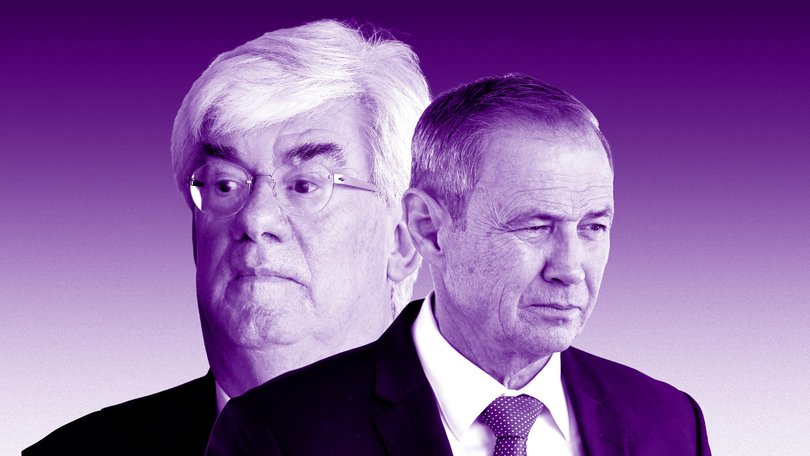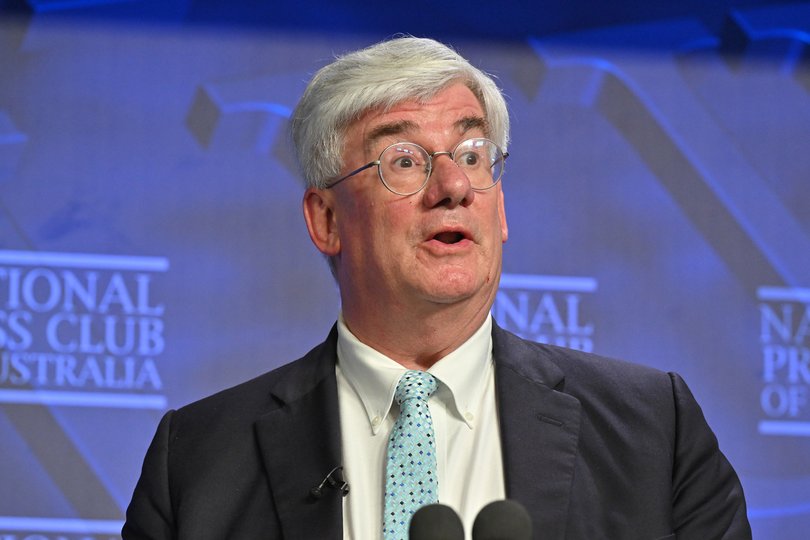BEN HARVEY: Doubling GST and scrapping other taxes would do Aussies a world of good
BEN HARVEY: Saying there is a good type of tax is like saying there is a good type of cancer. There’s not. Some taxes are less bad, though, and the GST is one of them.

The war over which State gets how much of the goods and services tax is on like Donkey Kong.
The carve-up has been a bone of contention ever since the tax was introduced at the start of new millennium and especially so since 2018, when Scott Morrison did a deal which put that 70¢ floor under the amount directed to WA.
The poster boy for the scrap-the-deal-movement is economist Saul Eslake, who is a native of the perpetually mendicant State of Tasmania.
Sign up to The Nightly's newsletters.
Get the first look at the digital newspaper, curated daily stories and breaking headlines delivered to your inbox.
By continuing you agree to our Terms and Privacy Policy.On the other side of the argument is WA Premier Roger Cook, who is doing his best to argue, without giggling, that an arrangement which is slowly bankrupting Australia is actually good for Australia.
And in the middle, with one knacker on each side of the fence, is Anthony Albanese, who must decide who is Peter and who is Paul when he next robs us.

With so many vested interests at play it’s hard to know who is lying but a good tip is to identify anyone whose lips are moving because when it comes to the GST, policymakers have been lying, duplicitous bastards for the best part of 40 years.
John Howard foisted the tax on us in 2000, despite promising in the lead-up to the 1998 election that he would “never ever” introduce a GST.
He made that pledge after his predecessor, John Hewson, argued for a consumption tax in the lead-up to the 1993 election.
The good doctor got smashed in that campaign, first by Mike Willesee (who tripped him up with a seemingly simple question about whether a birthday cake would get cheaper or more expensive) and then by Paul Keating (who by the early-1990s had forgotten that in 1985 he championed a GST but was shut down by Bob Hawke).
The lies and hypocrisy evident at the start have grown over time, in line with the size of the GST honeypot. Federal budget papers show that in 2025-26 the amount of GST distributed to the States will be (cue zoom-in on Dr Evil) $100.1 billion.
That money is distributed to the States based not on how much GST was raised in that State, or on a per capita basis, but rather according to a formula known as (cue Ferris Bueller’s economics teacher saying “anyone, anyone”) horizontal fiscal equalisation.
HFE ensured more tax went to poorer States so that Australia didn’t become a nation of haves and have-nots. For a while, it accomplished that goal without people getting in a tizz but then something happened in the mid-noughties that changed everything.
As China started building its new cities (and aircraft carriers) the price of iron ore went through the roof. West Australians became the nouveau riche of the southern hemisphere.
As mineral royalties went up, the State’s share of GST went down. The nation reached a crunch point a little over 10 years ago when the iron ore price cratered.
Then-WA premier Colin Barnett spent most of 2015 and 2016 complaining that his State was going from boom town to shanty town because its share of GST was plummeting toward 30¢.
That situation pissed off every West Australian and seeing 16 Federal seats in play, Scomo acted.
The 70¢ floor solved his problem in the west but created one in the east because giving WA more money than it was ordinarily entitled to meant giving other States less.
Seeing 134 seats east of the Nullarbor in play, Scomo introduced the no-worse-off rule which meant that WA would get more but not at the expense of the other States because Canberra would dip into general government revenue to make up the shortfall.
That shortfall got bigger and bigger. It started at $2.3b a year and, as the east coast press liked to point out, was soon at $25b, then $40b and is now on its way to $60b.
Eslake is rightly arguing that situation is not sustainable when the country has $1 trillion in debt and deficits across the forward estimates. He’s wrong to blame the 70¢ floor; the bit that’s not sustainable is the no-worse-off rule.
For ecological reasons Tasmania wants a pristine wilderness.
For philosophical reasons Victoria doesn’t want natural gas development.
That’s fine, but those governments should not expect West Australians to pay for the installation of steps to the high moral ground.
What incentive is there for economic development if the money you spend on roads, ports and power lines results in an ever-diminishing share of a pot of money you don’t have to lift a finger to receive?
Eslake is a little cheeky when he notes how, for decades, WA took more from the Federation than it contributed. True, but the west was paying the price for Federal policies aimed at propping up inefficient manufacturing industries in the east.
People in Perth were net recipients of Federal funds, but they had to drive a Holden Camira as a quid pro quo.
Cook’s duplicity is evident in the $1 million he is spending advertising the fact that GST revenue is funding critical infrastructure needed for the wealth-generating resources industry.
His marketing campaign is not designed to convince Sydneysiders and Melburnians of the merits of the deal; it’s about showing West Australians he is taking the fight to the wise men from the east.
And can you really say the money is going to nation-building causes when you’re spending a chunk of it supporting a greenhorn NRL team in Perth and building a new racetrack in the city?
Albanese’s pledge that he wants a fair go for WA should have a giant asterisk next to it, with the small print detailing that said support for a fair go is contingent on the number of WA votes he wins out west eclipsing the number of votes he loses in the east.
The GST debate is not about economics or fairness; it’s about politics and, as always, politics is ruining everything.
Saying there is a good type of tax is like saying there is a good type of cancer. There’s not. Some taxes are less bad, though, and the GST is one of them.
To prove that, you need to consider the only thing more boring than horizontal fiscal equalisation — marginal excess burden.
MEB is an economic tool that measures how badly a tax distorts economic choices.
Income tax and payroll tax have high MEBs because they discourage workers from working and employers from employing.
The GST has a very low marginal excess burden, which is why many economists reckon it would be better to double this tax and scrap many others.
We’d all be better off, but good luck to the politician who advocates going higher than 10 per cent.
The logic of electoral mathematics will always trump the logic of sound economic policy.

